Hans Litten: The Courageous Lawyer Who Dared to Cross-Examine Hitler

In the annals of history, there are figures whose bravery and conviction shine as beacons of resistance against tyranny. Hans Litten, a young Jewish lawyer in Weimar Germany, stands out as one such figure. His claim to fame? He was the only person to ever cross-examine Adolf Hitler in a court of law. This blog delves into the life of Hans Litten, his remarkable courage in confronting the rising tide of Nazism, and the tragic consequences he faced for his unwavering commitment to justice.
Early Life and Legal Career
Hans Litten was born on June 19, 1903, in Halle, Germany. The son of a law professor, Litten showed early promise in academics and developed a keen interest in social justice. Despite his privileged background, he aligned himself with the working class and became deeply involved in left-wing politics during his university years.
After completing his legal studies, Litten began practicing law in Berlin in 1928. He quickly gained a reputation as a brilliant and passionate advocate for workers’ rights and opponents of the Nazi Party. Litten’s legal strategy often involved using courtrooms as political stages, turning trials into public exposures of Nazi violence and intimidation tactics.
The Eden Dance Palace Trial
The defining moment of Litten’s career came in 1931 with the Eden Dance Palace trial. On November 22, 1930, a group of Nazi Sturmabteilung (SA) men had attacked a dance hall frequented by left-wing workers in Berlin. The attack left several people seriously injured. Litten, representing the victims, saw an opportunity to challenge the Nazi Party’s claims of legality and non-violence.
In a bold and unprecedented move, Litten subpoenaed Adolf Hitler as a witness. Hitler, at this time, was not yet Chancellor but was rapidly gaining political power. The Nazi leader had been careful to present himself as a legitimate political figure, distancing himself from the violent tactics of the SA.
Litten’s strategy was clear: he aimed to expose Hitler’s connection to and approval of SA violence, thereby undermining the Nazi Party’s credibility. On May 8, 1931, Hitler was compelled to appear in court.
The Cross-Examination
The cross-examination lasted for three hours, during which Litten relentlessly questioned Hitler about Nazi ideology, the party’s use of violence, and Hitler’s own writings in “Mein Kampf.” Litten’s questioning was incisive and well-prepared. He confronted Hitler with contradictions between his public statements advocating legal political change and the violent reality of SA actions.
Hitler, known for his charismatic speeches, found himself flustered and defensive under Litten’s surgical questioning. At one point, Hitler even lost his composure, a rare public display of weakness for the Nazi leader. Litten’s probing questions forced Hitler to either admit to encouraging violence or to distance himself from his own storm troopers, both politically damaging options.

Although the immediate outcome of the trial was mixed, with only a few SA men receiving light sentences, Litten’s cross-examination had significant repercussions. It publicly embarrassed Hitler, exposed the violent nature of the Nazi movement, and provided ammunition for Nazi opponents. Hitler was so shaken by the experience that he thereafter refused to appear in court and harboured a deep, personal hatred for Litten.
Continued Resistance and Persecution
Undeterred by the growing threat to his safety, Litten continued his legal crusade against the Nazis. He defended communists, social democrats, and others targeted by Nazi violence. His courtroom battles became legendary, as he consistently outmanoeuvred Nazi lawyers and exposed the brutality of the regime.
However, Litten’s bravery came at a terrible cost. When Hitler came to power in 1933, Litten was among the first to be arrested. On the night of February 28, 1933, immediately after the Reichstag fire, Litten was taken into “protective custody” along with other prominent opponents of the Nazi regime.
Life in the Concentration Camps
For Litten, this marked the beginning of a five-year ordeal in various concentration camps. He was initially held in SA prisons and makeshift camps, where he endured severe beatings and torture. Despite the brutality, Litten refused to break. He maintained his dignity and even organized educational lectures for fellow prisoners when possible.
In 1933, Litten was transferred to the Sonnenburg concentration camp. Here, the conditions were even more brutal. Litten faced regular beatings, sleep deprivation, and psychological torture. The Nazis, aware of his Jewish heritage and his role in humiliating Hitler, singled him out for particularly harsh treatment.
Throughout his imprisonment, Litten’s spirit remained unbroken. He continued to resist in whatever ways he could, offering legal advice to fellow prisoners and maintaining his intellectual pursuits. In one poignant incident, when forced to sing Nazi songs, Litten defiantly sang “The Internationale” instead, knowing full well the punishment that would follow.
Litten’s family and friends campaigned tirelessly for his release. His mother, Irmgard Litten, wrote letters to influential figures around the world, including the British Foreign Secretary and even Hitler himself. These efforts, while unsuccessful in securing his freedom, may have prevented his immediate execution.
In 1937, Litten was transferred to Buchenwald concentration camp. The conditions here were even more horrific, and Litten’s health began to deteriorate rapidly. Despite this, he continued to offer hope and support to his fellow inmates, organizing discussion groups and even a clandestine cabinet of prisoner representatives.
The Final Act of Defiance

By early 1938, after five years of unimaginable suffering, Litten’s physical and mental health had been severely compromised. On February 5, 1938, fearing transfer to another camp and unable to endure further torture, Hans Litten made the decision to end his own life. He hanged himself in the camp latrine, his final act one of defiance against his Nazi tormentors.
Litten’s suicide was a profound loss, not only to his family and friends but to the cause of justice he had so bravely championed. He was just 34 years old.
Legacy and Remembrance
Hans Litten’s courage in standing up to Hitler and the Nazi regime, both in the courtroom and in the concentration camps, has earned him a place among the heroes of resistance against tyranny. His story, while tragic, serves as a powerful reminder of the importance of standing up for justice and human rights, even in the face of overwhelming odds.
In the years following World War II, efforts were made to ensure Litten’s bravery would not be forgotten. Streets and schools in Germany have been named after him, and his story has been the subject of books, plays, and documentaries. In 2011, the German Bar Association established the Hans Litten Prize, awarded to lawyers who defend human rights and civil liberties at great personal risk.
Litten’s cross-examination of Hitler remains a pivotal moment in legal history. It demonstrated the power of the law as a tool for exposing injustice and challenging authoritarian regimes. Litten’s skilful use of legal proceedings to shine a light on Nazi violence provided a model for future human rights lawyers and activists.
Reflections on Courage and Sacrifice
Hans Litten’s life and death raise profound questions about the nature of courage and the price of standing up for one’s beliefs. In an era when many chose to look away or accommodate themselves to the rising tide of Nazism, Litten chose to confront it head-on. His actions remind us that even in the darkest times, individual acts of bravery can make a difference.
Litten’s story also highlights the vital role of the legal profession in defending democracy and human rights. As a lawyer, Litten understood that the courtroom could be a powerful arena for exposing truth and challenging injustice. His example continues to inspire lawyers and human rights defenders around the world who use legal means to fight oppression and defend the vulnerable.
The tragedy of Litten’s fate underscores the brutal reality of totalitarian regimes and the dangers faced by those who dare to oppose them. It serves as a stark reminder of the fragility of democratic institutions and the need for constant vigilance in their defence.In remembering Hans Litten, we honour not only his individual bravery but also the broader struggle for justice and human dignity. His story challenges us to consider what we would be willing to sacrifice for our principles and inspires us to find the courage to speak truth to power. In a world still grappling with authoritarianism and injustice, the spirit of Hans Litten remains as relevant and necessary as ever.
References:
- Sifton, Elisabeth. “The Seduction of Law: Writing the Life of Hans Litten.” German Life and Letters, vol. 64, no. 3, 2011, pp. 411-422.
- Hett, Benjamin Carter. “Hans Litten and the Politics of Criminal Law in the Late Weimar Republic.” Modern Germany in Transatlantic Perspective, 2017, pp. 61-78.
- Furst, Alan. “A Man Who Dared to Tell Hitler No.” The New York Times, 3 Aug. 2007.
- Koch, H. W. In the Name of the Volk: Political Justice in Hitler’s Germany. I.B. Tauris, 1997.
- Evans, Richard J. The Coming of the Third Reich. Penguin, 2005.
- Burleigh, Michael. The Third Reich: A New History. Hill and Wang, 2001.
Image References:
- https://www.fr.de/kultur/literatur/hans-litten-anwalt-gegen-hitler-hitler-im-zeugenstand-91443548.html
- https://liberation.org.in/liberation-2022-may/lawyering-impossible-times-remembering-nazi-germanys-treatment-lawyers
- https://www.ohtuleht.ee/1080023/hans-litten-juudi-paritolu-advokaat-kes-alandas-kohtusaalis-adolf-hitlerit
